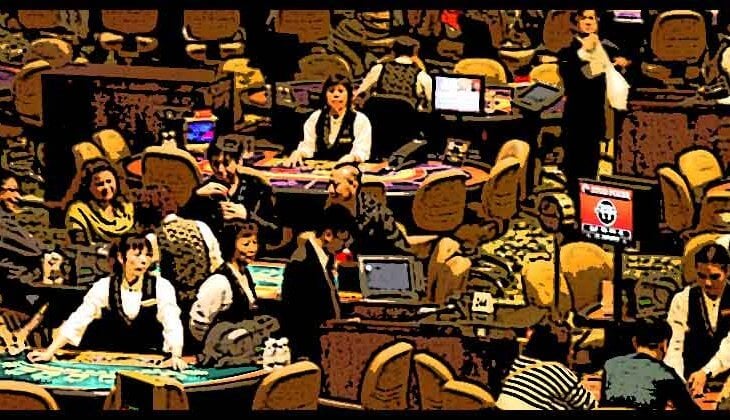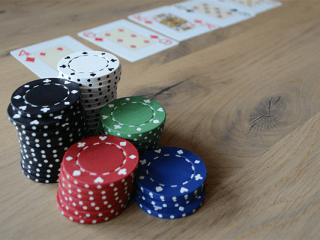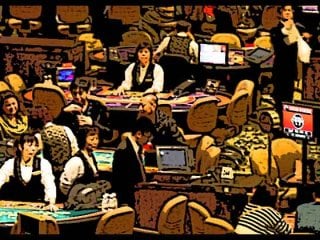Poker Etiquette – Don’t Break One Of These 12 Rules
By Alex Smith, Last updated Mar 23, 2024

Poker Etiquette is very important, and it refers to the way that players should be acting at the poker table. Poker Etiquette is, for the most part, a set of unwritten rules – so while players don’t usually receive any penalties for breaking any of the Poker Etiquette rules listed here on this page, it’s considered poor taste to do so. When you ensure you’re not breaking Poker Etiquette rules, you will ensure that you are promoting good sportsmanship – and you will be helping to aid a healthy atmosphere at the table.
You will find that Poker Etiquette varies quite a lot depending on where in the world you’re playing. Poker Etiquette is different at land-based casinos than it is at online casinos, and some land-based casinos have their own unique Poker Etiquette rules.
On this page, we will look at ten of the most common rules of Poker Etiquette you should be aware of when playing at the poker table.

$ 35 for USD /CAD
No Maximum
40 x
No code required
–
–
Yes
Get $9,750 in free bets with Casino Max’s amazing welcome offer. 325% match for your 1st, 2nd and 3rd deposits.
Crypto Deposit: $10+ for a 350% bonus
All Deposits: $35+ for a 325% bonus
Wagering: 40x
– Total Maximum Bet is $10
– Bonuses will automatically be removed at the point of requesting a withdrawal

$10; $20 if depositing via BTC
N/A
20x (deposit+bonus)
–
–
$110
Yes
Act Swiftly When Playing Casino Poker
One of the first things that you should keep in mind at the poker table is to always act swiftly where you can. While it’s only natural that you will need time to think from time to time, you should always try to make sure the game isn’t held up unnecessarily. There are a few factors to this – and they are usually more prevalent in cash games than they are in tournaments. Firstly, you should always avoid Hollywood-ing when you’re heads-up.
If you don’t know what Hollywoodying means, it’s when you know you’re going to fold when you’re heads-up against your opponent – yet you decide to stall, for no real reason. Not only is this generally considered to be Poker Etiquette, but it’s also really annoying for other players; it holds up the game, slows down the gameplay – and if you’re playing a casino game in a tournament-style, it can end up hurting all players at the table.
Secondly, you should always pay attention to the game when you’re involved with a hand. You’d be amazed how many players end up watching TV or browsing their phone when they’re involved with a pot – and this is considered to be bad Poker Etiquette.
Another way you can slow down the game without knowing it is to talk to a waitress or another player – while the rest of the table waits for your action. You should always try to pay close attention to the game, especially when you are involved with a hand.
Always Try to Pay Attention
We’ve just talked about the importance of paying attention – but it’s actually a part of Poker Etiquette in itself – especially when playing live poker. You see, when you play poker online, it doesn’t matter; if you don’t pay attention, you quickly get timed out – and the other players aren’t affected. However, when you’re playing casino poker, it does have a big impact.
For example, at the poker table today, it’s pretty common for players to plug in their electronic devices and listen to music while playing. However, if you want to play responsibly, you should never have your music set to a level that’s too loud so that you end up missing out on hearing what’s actually going on at the table. As a caveat to this, you may also end up missing out on hearing valuable information from your opponents that may help to influence your decision.
When you’re playing poker, you should also be very careful to make sure that you are acting in turn; failing to do so is a common side effect from not paying attention. While you won’t get in trouble for occasionally acting out of turn – provided it’s accidental – repeatedly doing this is going to cause a problem, and could get you in trouble at the poker rooms you are playing at.
Show Respect to Other Players
When you head to physical land-based casinos or poker rooms, it’s really important to make sure that the atmosphere is a positive one. Of course, when you’re losing money, it’s only natural to be a bit grumpy – but you should try your absolute best to not let this impact your decision making at the table. You should always try your absolute best to be polite and respectful to other players, regardless of how things are going for you.
For example, you should always avoid berating or taking the mick out of other players. If another player at the table makes a move that you would have done differently, don’t sit around telling them that; keep your thoughts to yourself, and remember that not everyone thinks on the same level as you.
Telling other players how you think they should have played a hand instead, not only hurts their psyche – you could end up unintentionally revealing information about your poker mindset and ability level to other players at the table.
Another thing that falls under this umbrella is making sure that you keep yourself composed after you suffer a bad beat. If you are able to compose yourself and keep your cool, not only will you be showing the other players at the table that you’re a serious contender – you will also stand a much great chance of recouping your losses later in the night as you will be able to manage your emotions and play your best game.
If you do hit a bad beat and end up losing your temper, or your cool, you are showing your opponents that you are prone to tilting – something that could try to take advantage of over the next few hands. Another general rule of thumb to be aware of at the poker table is that you should try your best to avoid being rude or mean. It’s simply unnecessary, and it’s not going to win you any friends while playing the casino game.
You should also avoid taking any frustrations out on the dealer; it’s not their fault that you were dealt a bonus river card. If you are struggling to manage your emotions, the best thing that you can do is to take a walk away from the table; go grab a drink, take a five minute walk, or have a smoke break.
Try to Avoid Pointless Arguments
One of the most annoying things that you can encounter at the poker table is argumentative players. Arguments at the table seldom accomplish anything, and they completely go against the advice of being respectful. If you encounter a situation where you have a genuine problem with another player – maybe they’ve been making string bets, or did a slow roll on a very big pot – the best thing that you can do is to call the floor manager. If you’re playing in online games, you can contact the customer support team at the poker site that you are playing at.
If you get into an argument at the table, it really doesn’t serve you any good. Live poker is all about having fun, and no one wants to be inundated with arguments. Think about how you would feel if you were surrounded by argumentative players – it’s simply not fun.
Another thing to bear in minimum deposit is that if you’re thinking about accusing another player of cheating – or breaking the rules in any way, shape, or form – then you should be 100% sure that they actually did something wrong before you escalate the situation. Sure, string betting is annoying – as is players hiding big chips behind their chip stack – but, before you make a huge deal out of it, ensure you’re not acting irrationally and incorrectly.
Don’t Unnecessarily Disturb Other Players at the Poker Table
It is considered incredibly poor poker etiquette to unnecessarily disturb other players at the table. This is especially true for players who are actively involved with a hand. For starters, the last thing that you want at the poker table is to be seen as a disruptive player who causes a nuisance at the table. There are a number of ways that you could be seen as disturbing others. Firstly, talking too loudly; it’s the weekend, you’re out to have a good time, and you have just hit a massive winning hand – everyone gets it!
However, there are a number of things that you should avoid doing at the poker table when other players are involved with a hand, and when you are not. For example, you should try to avoid talking too loudly where possible. You would be amazed at how much your voice can put people off – and this can be especially irritating if you’re in the middle of a big pot. If you’re using headphones, you should also try to be considerate about the volume of your music.
It’s also considered to be pretty bad etiquette – and often against the rules – to take phone calls at the table. At the very least, you should turn away from the table if you have to pick up a call. Ideally, you should walk away from the table and leave the other players to play in peace.
It can also be a very good idea to bring a pair of headphones. There’s nothing worse than being sat next to a boisterous, loud and obnoxious player – and playing next to someone like this can actually even put you off your game! The best thing to do to combat this is to simply plug your headphones in and do your best to distance yourself from it.
Never Say or Do Anything That Could Influence a Pot That You’re Not In
One of the worst things that you can do at the poker table in terms of etiquette is saying things about a hand that you’re not involved in. Not only is this considered to be very poor etiquette, it’s also against the rules at many land-based casinos and poker rooms. However, this goes a lot deeper than simply avoiding talking during a hand. There are a number of things to be aware of – and the first thing you should be aware of is that you should NEVER say what your hole cards were while a hand is in progress. However, it’s fine to do so one the hand has ended.
If you decide to fold your hand, and there are other players still in the hand, you should never show your cards face-up. You should also avoid showing them to any other players, as doing so could give your opponent an unfair advantage over other players at the table.
Another thing to be aware of is that when you’re playing poker you should never verbally or visually react to a hand that is still in progress. If you do so you may be told off by the dealer. The reason why this is considered to be bad poker etiquette is that if you react, you may be giving away information about the hand that you held. This could then be used by other players at the table to gain an unfair advantage over what decision they should make – especially if a player is all-in and is trying to figure out what to do in the hand.
Finally, you should also avoid announcing things about the current hand. For example, some annoying players will say something like “there’s no straight on the board, what you are waiting for”. While this may seem like innocent conversation, it’s worth pointing out that this could again, influence the game – and it could cause someone to make a decision that they wouldn’t otherwise have made.
Proper Poker Etiquette: Don’t Angle Shoot
Angle shooting is perhaps one of the biggest annoyances a player can do at the table. Angle shooting is defined as doing something that is unethical yet intentional – and it usually involves deceptive practices that try to take advantage of other players at the table. For example, if you are involved in a multi-player pot, and are talking to one of the other players involved with the hand about the strength of their hand, or what action they should take – that could be considered angle shooting.
Another example of angle shooting is when you are intentionally unclear about the action that you want to take. For example, you may pretend to throw your cards away to gauge your opponent’s reaction, only to then call their bet when it’s clear their hand is a weak one.
Misrepresenting your hand or the action intentionally – for example, saying you have a straight when you’re done – is another form of angle shooting. A string bet can also be considered to be an angle shoot, and it’s generally frowned upon at the poker table.
Don’t “Hit and Run” From Cash Games
While there’s technically nothing wrong with doing a hit and run (walking away from the table after you scoop a big pot), it’s considered to be bad poker etiquette. Some land-based casinos will have a rule that if you leave a cash game, you will not be able to sit down at another table for a certain amount of time if you leave the table as a winner. This is to try and prevent hit and runs from taking place.
There is nothing worse than losing all your chips in a big pot, only for the player involved in the pot to get up and move their chips to another table. This means you simply don’t have a chance to win back your chips. Avoid doing this at all costs, as it’s considered to be very bad form.
Be a Gracious Winner
While most of the tips on this list have focused on the negatives, it’s also worth pointing out that you should be a gracious winner, too. For example, if you win a hand, it’s only natural to feel good – you may want to celebrate inside! However, keep in mind that when you win a pot, another player has just lost a pot. It’s fine to look happy, but bear in mind that the other player is likely not feeling too good – so do try to be mindful about this.
You should also avoid adding insult to injury by criticizing your opponent’s player when you do win a pot. As we just mentioned, they are already going to feel pretty bad from losing – and if you add salt to the wound, you’re just breaching the rules of poker etiquette.
Lastly, if you win a big pot, it’s considered polite to tip the dealer. You don’t have to give them a fortune – but it’s fair to give them a small chip for their work.
Don’t be a Sore Loser
We have just talked about the importance of being a gracious winner. However, it’s also really important to avoid a sore loss. If you end up on the wrong side of a bad beat or a cooler, don’t take your frustration out on the dealer; it’s not their fault, even if it may seem like it at the time. Similarly, if you lose a hand, don’t berate the other players at the table. Doing so makes you look like an idiot, and it won’t win you any friends.
You should also avoid swearing, slamming your fists down onto the table, or angrily throwing your cards or your chips at another player – or worse, the dealer. Such behavior is not going to be tolerated at any reputable land-based casino or poker hall, and you could find yourself ejected from the premises for doing such things.
If you lose a pot, try to remain calm, and say something like “nice hand” to your opponent.
Good Poker Etiquette
There are also examples of good poker etiquette at the table. Regardless of what happened on your previous bet, you can make sure that you are a gracious player by doing the following things when you sit down at the poker table and begin to play!
Make Sure your Chip Stack is Visible
You should make sure that your chip stack is fully-visible at all times. Whatever you do, don’t block your chip stack using your hands. Doing so is considered to be very poor etiquette, and most land-based casinos and poker rooms now have rules against this. If somebody asks you how many chips you have, move your hands so they can see; you don’t have to verbally tell them if you don’t want to. Your chips should also be stacked into easy-to-read piles, with all of your high-value chips in the same pile.
Your chips should also remain in front of your playing position; take care to ensure that they don’t accidentally end up on the wrong side of the line, as this could cause the dealer to mistakenly assume you are calling a big bet or an all-in.

$ 35 for USD /CAD
No Maximum
40 x
No code required
–
–
Yes
Get $9,750 in free bets with Casino Max’s amazing welcome offer. 325% match for your 1st, 2nd and 3rd deposits.
Crypto Deposit: $10+ for a 350% bonus
All Deposits: $35+ for a 325% bonus
Wagering: 40x
– Total Maximum Bet is $10
– Bonuses will automatically be removed at the point of requesting a withdrawal

$10; $20 if depositing via BTC
N/A
20x (deposit+bonus)
–
–
$110
Yes
Bet and Act with Clarity where Possible
888 Poker says the following about acting with clarity:
“Sometimes, it can be ambiguous what your intentions are (both in action and sizing) when you place a certain amount of chips forward. If in doubt, always verbally declare what you want to do before you physically do it.”
We find this to be really good advice, and we strongly recommend that you follow this advice where possible.
Protect your Hole Cards
When you’re involved in a hand, your hole cards are the most important asset that you hold. You should always make sure that they’re protected, to avoid any accidental turning over of your cards. Be aware that this will result in you not being able to make any more positive action during the hand; you will only be able to call or fold, not raise.
If possible, you should get a card protector to look after your cards. This also prevents you from accidentally mucking your hand – something that even the best of us have experience with, unfortunately!
Poker Related d Articles
How Many Hands Per Hour: Live Poker Explained
In this blog post, we’ll dive into the factors influencing the number of hands dealt per hour in live poker.
How Does a Casino Make Money on Poker?
It will come as no surprise to learn that online poker sites and online casinos are in the business of making money; that’s their ultimate goal, and while many of these sites may offer attractive – and lucrative – bonuses and promotions designed to temp in new players, the ultimate goal is to generate as much revenue as possible.
How to Play Slow Roll Poker
The goal of poker is to beat your opponent; in fact, doing so is actively encouraged! However, while you should always try your best to throw your opponents off-balance and coerce them to make mistakes
What is the Dead Man’s Hand in Poker?
The deadman’s hand is one of the most iconic hands in poker. While some players have slightly different definitions of the dead man’s hand, most people regard it as a hand containing two Aces and two Eights – equalling two pairs. However, while the hand may look quite simple, there is much more to meet the eye.
What Happened to Mike Matusow
If you’re wondering what’s actually happened to Mike Matusow – and want to know what this colorful character is up to these days – keep reading to find out what this star poker player is up to these days!




 Top 5 casinos
Top 5 casinos 

